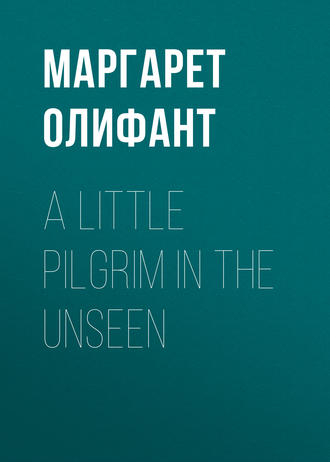
Маргарет Олифант
A Little Pilgrim in the Unseen
"It is not as it was," Ama said. "For all of us have work to do which is needed for the worlds, and it is no longer needful that one should sit at home while the other goes forth; for our work is not for our life as of old, or for ourselves, but for the Father who has given us so great a trust. And, little sister, you must know that though we are not so great as the angels, nor as many that come to visit us from the other worlds, yet we are nearer to Him. For we are in His secret, and it is ours to make it clear."
The little Pilgrim's heart was very full to hear this; but she said—
"I was never clever, nor knew much. It is better for me to go away to my little border-land, and help the strangers who do not know the way."
"Whatever is your work is the best," the lady said; "but though you are so little you are in the Father's secret too; for it is nature to you to know what the others cannot be sure of, that we must have the victory at the last. So that we have this between us, the Father and we. And though all are His children, we are of the kindred of God, because of our Lord who is our Brother;" and then the Lady Ama kissed her, and bade her when she returned to the great city, either for rest or for love, or because the Father sent for her, that she should come to the house by the river. "For we are friends for ever," she said, and so threw her white veil over her head, and was gone upon her mission, whither the little Pilgrim did not know.
And now she found herself at a distance from the great city which shone in the light with its beautiful towers, and roofs, and all its monuments, softly fringed with trees, and set in a heavenly firmament. And the Pilgrim thought of those words that described this lovely place as a bride adorned for her husband, and did not wonder at him who had said that her streets were of gold and her gates of pearl, because gold and pearls and precious jewels were as nothing to the glory and the beauty of her. The little Pilgrim was glad to have seen these wonderful things, and her mind was like a cup running over with almost more than it could contain. It seemed to her that there never could be a time when she should want for wonder and interest and delight so long as she had this to think of. Yet she was not sorry to turn her back upon the beautiful city, but went on her way singing in unutterable content, and thinking over what the lady had said, that we were in God's secret, more than all the great worlds above and even the angels, because of knowing how it is that in darkness and doubt, and without any open vision, a man may still keep the right way. The path lay along the bank of the river which flowed beside her and made the air full of music, and a soft air blew across the running stream and breathed in her face and refreshed her, and the birds sang in all the trees. And as she passed through the villages the people came out to meet her, and asked of her if she had come from the city, and what she had seen there. And everywhere she found friends, and kind voices that gave her greeting. But some would ask her why she still spoke the little language, though it was sweet to their ears; and others when they heard it hastened to call from the houses and the fields some among them who knew the other tongue but a little, and who came and crowded round the little Pilgrim and asked her many questions both about the things she had been seeing and about the old time. And she perceived that the village folk were a simple folk, not learned and wise like those she had left. And that though they lived within sight of the great city, and showed every stranger the beautiful view of it, and the glory of its towers, yet few among them had travelled there; for they were so content with their fields and their river, and the shade of their trees and the birds singing, and their simple life, that they wanted no change; though it pleased them to receive the little Pilgrim, and they brought her in to their villages rejoicing, and called every one to see her. And they told her that they had all been poor and laboured hard in the old time, and had never rested; so that now it was the Father's good pleasure that they should enjoy great peace and consolation among the fresh-breathing fields and on the riverside, so that there were many who even now had little occupation except to think of the Father's goodness and to rest. And they told her how the Lord Himself would come among them, and sit down under a tree, and tell them one of His parables, and make them all more happy than words could say; and how sometimes He would send one out of the beautiful city, with a poem or tale to say to them, and bands of lovely music, more lovely than anything beside, except the sound of the Lord's own voice. "And what is more wonderful, the angels themselves come often and listen to us," they said, "when we begin to talk and remind each other of the old time, and how we suffered heat and cold, and were bowed down with labour, and bending over the soil; and how sometimes the harvest would fail us, and sometimes we had not bread, and sometimes would hush the children to sleep because there was nothing to give them; and how we grew old and weary, and still worked on and on." "We are those who were old," a number of them called out to her, with a murmuring sound of laughter, one looking over another's shoulder. And one woman said, "The angels say to us, 'Did you never think the Father had forsaken you and the Lord forgotten you?'" And all the rest answered as in a chorus, "There were moments that we thought this; but all the time we knew that it could not be." "And the angels wonder at us," said another. All this they said, crowding one before another, every one anxious to say something, and sometimes speaking together, but always in accord. And then there was a sound of laughter and pleasure, both at the strange thought that the Lord could have forgotten them, and at the wonder of the angels over their simple tales. And immediately they began to remind each other, and say, "Do you remember?" and they told the little Pilgrim a hundred tales of the hardships and troubles they had known, all smiling and radiant with pleasure; and at every new account the others would applaud and rejoice, feeling the happiness all the more for the evils that were past. And some of them led her into their gardens to show her their flowers, and to tell her how they had begun to study and learn how colours were changed and form perfected, and the secrets of the growth and of the germ of which they had been ignorant. And others arranged themselves in choirs, and sang to her delightful songs of the fields, and accompanied her out upon her way, singing and answering to each other. The difference between the simple folk and the greatness of the others made the little Pilgrim wonder and admire, and she loved them in her simplicity, and turned back many a time to wave her hand to them, and to listen to the lovely simple singing as it went farther and farther away. It had an evening tone of rest and quietness, and of protection and peace. "He leadeth me by the green pastures and beside the quiet waters," she said to herself: and her heart swelled with pleasure to think that it was those who had been so old, and so weary and poor, who had this rest to console them for all their sorrows.
And as she went along, not only did she pass through many other villages, but met many on the way who were travelling towards the great city, and would greet her sweetly as they passed, and sometimes stop to say a pleasant word, so that the little Pilgrim was never lonely wherever she went. But most of them began to speak to her in the other language, which was as beautiful and sweet as music, but which she could not understand: and they were surprised to find her ignorant of it, not knowing that she was but a new-comer into these lands. And there were many things that could not be told but in that language, for the earthly tongue had no words to express them. The little Pilgrim was a little sad not to understand what was said to her, but cheered herself with the thought that it should be taught to her by one whom she loved best. The way by the riverside was very cheerful and bright, with many people coming and going, and many villages, some of them with a bridge across the stream, some withdrawn among the fields, but all of them bright and full of life, and with sounds of music, and voices, and footsteps: and the little Pilgrim felt no weariness, but moved along as lightly as a child, taking great pleasure in everything she saw, and answering all the friendly greetings with all her heart, yet glad to think that she was approaching ever nearer to the country where it was ordained that she should dwell for a time and succour the strangers, and receive those who were newly arrived. And she consoled herself with the thought that there was no need of any language but that which she knew. As this went through her mind making her glad she suddenly became aware of one who was walking by her side, a lady who was covered with a veil white and shining like that which Ama had worn in the beautiful city. It hung about this stranger's head so that it was not easy to see her face, and the sound of her voice was very sweet in the Pilgrim's ear, yet startled her like the sound of something which she knew well, but could not remember. And as there were few who were going that way, she was glad, and said, "Let us walk together, if that pleases you." And the stranger said, "It is for that I have come," which was a reply which made the little Pilgrim wonder more and more, though she was very glad and joyful to have this companion upon her way. And then the lady began to ask her many questions, not about the city, or the great things she had seen, but about herself, and what the dear Lord had given her to do.
"I am little and weak, and I cannot do much," the little Pilgrim said. "It is nothing but pleasure. It is to welcome those that are coming, and tell them. Sometimes they are astonished and do not know. I was so myself. I came in my sleep, and understood nothing. But now that I know, it is sweet to tell them that they need not fear."
"I was glad," the lady said, "that you came in your sleep: for sometimes the way is dark and hard, and you are little and tender. When your brother comes you will be the first to see him, and show him the way."
"My brother! is he coming?" the little Pilgrim cried. And then she said with a wistful look, "But we are all brethren, and you mean only one of those who are the children of our Father. You must forgive me that I do not know the higher speech, but only what is natural, for I have not yet been long here."
"He whom I mean is called—" and here the lady said a name which was the true name of a brother born, whom the Pilgrim loved above all others. She gave a cry, and then she said trembling, "I know your voice, but I cannot see your face. And what you say makes me think of many things. No one else has covered her face when she has spoken to me. I know you, and yet I cannot tell who you are."
The woman stood for a little without saying a word, and then very softly, in a voice which only the heart heard, she called the little Pilgrim by her name.
"MOTHER," cried the Pilgrim, with such a cry of joy that it echoed all about in the sweet air: and flung herself upon the veiled lady, and drew the veil from her face, and saw that it was she. And with this sight there came a revelation which flooded her soul with happiness. For the face which had been old and feeble was old no longer, but fair in the maturity of day; and the figure that had been bent and weary was full of a tender majesty, and the arms that clasped her about were warm and soft with love and life. And all that had changed their relations in the other days and made the mother in her weakness seem as a child, and transferred all protection and strength to the daughter, was gone for ever: and the little Pilgrim beheld in a rapture one who was her sister and equal, yet ever above her—more near to her than any, though all were so near—one of whom she herself was a part, yet another, and who knew all her thoughts and the way of them before they arose in her. And to see her face as in the days of her prime, and her eyes so clear and wise, and to feel once more that which is different from the love of all, that which is still most sweet where all is sweet, the love of one—was like a crown to her in her happiness. The little Pilgrim could not think for joy, nor say a word, but held this dear mother's hands and looked in her face, and her heart soared away to the Father in thanks and joy. They sat down by the roadside under the shade of the trees, while the river ran softly by, and everything was hushed out of sympathy and kindness, and questioned each other of all that had been and was to be. And the little Pilgrim told all the little news of home, and of the brothers and sisters and the children that had been born, and of those whose faces were turned towards this better country; and the mother smiled and listened and would have heard all over and over, although many things she already knew. "But why should I tell you? for did not you watch over us and see all we did, and were not you near us always?" the little Pilgrim said.
"How could that be?" said the mother; "for we are not like our Lord, to be everywhere. We come and go where we are sent. But sometimes we knew and sometimes saw, and always loved. And whenever our hearts were sick for news it was but to go to Him, and He told us everything. And now, my little one, you are as we are, and have seen the Lord. And this has been given us, to teach our child once more, and show you the heavenly language, that you may understand all, both the little and the great."
Then the Pilgrim lifted her head from her mother's bosom, and looked in her face with eyes full of longing. "You said 'we,'" she said.
The mother did nothing but smile; then lifted her eyes and looked along the beautiful path of the river to where some one was coming to join them; and the little Pilgrim cried out again, in wonder and joy; and presently found herself seated between them, her father and her mother, the two who had loved her most in the other days. They looked more beautiful than the angels and all the great persons whom she had seen; for still they were hers and she was theirs, more than all the angels and all the blessed could be. And thus she learned that though the new may take the place of the old, and many things may blossom out of it like flowers, yet that the old is never done away. And then they sat together, telling of everything that had befallen, and all the little tender things that were of no import, and all the great changes and noble ways, and the wonders of heaven above and the earth beneath, for all were open to them, both great and small; and when they had satisfied their souls with these, her father and mother began to teach her the other language, smiling often at her faltering tongue, and telling her the same thing over and over till she learned it; and her father called her his little foolish one, as he had done in the old days; and at last, when they had kissed her and blessed her, and told her how to come home to them when she was weary, they gave her, as the Father had permitted them, with joy and blessing, her new name.
The little Pilgrim was tired with happiness and all the wonder and pleasure, and as she sat there in the silence leaning upon those who were so dear to her, the soft air grew sweeter and sweeter about her, and the light faded softly into a dimness of tender indulgence and privilege for her, because she was still little and weak. And whether that heavenly suspense of all her faculties was sleep or not she knew not, but it was such as in all her life she had never known. When she came back to herself, it was by the sound of many voices calling her, and many people hastening past and beckoning to her to join them.
"Come, come," they said, "little sister: there has been great trouble in the other life, and many have arrived suddenly and are afraid. Come, come, and help them—come and help them!"
And she sprang up from her soft seat, and found that she was no longer by the riverside, or within sight of the great city or in the arms of those she loved, but stood on one of the flowery paths of her own border-land, and saw her fellows hastening towards the gates where there seemed a great crowd. And she was no longer weary, but full of life and strength, and it seemed to her that she could take them up in her arms, those trembling strangers, and carry them straight to the Father, so strong was she, and light, and full of force. And above all the gladness she had felt, and all her pleasure in what she had seen, and more happy even than the meeting with those she loved most, was her happiness now, as she went along as light as the breeze to receive the strangers. She was so eager that she began to sing a song of welcome as she hastened on. "Oh, welcome, welcome!" she cried; and as she sang she knew it was one of the heavenly melodies which she had heard in the great city: and she hastened on, her feet flying over the flowery ways, thinking how the great worlds were all watching, and the angels looking on, and the whole universe waiting till it should be proved to them that the dear Lord, the Brother of us all, had chosen the perfect way, and that over all the evil and the sorrow He was the Conqueror alone.
And the little Pilgrim's voice, though it was so small, echoed away through the great firmament to where the other worlds were watching to see what should come, and cheered the anxious faces of some great lords and princes far more great than she, who were of a nobler race than man; for it was said among the stars that when such a little sound could reach so far, it was a token that the Lord had chosen aright, and that His method must be the best. And it breathed over the earth like some one saying, Courage! to those whose hearts were failing; and it dropped down, down, into the great confusions and traffic of the Land of Darkness, and startled many, like the cry of a child calling and calling, and never ceasing, "Come! and come! and come!"
THE END.
Printed by R. & R. CLARK, LIMITED, Edinburgh.







